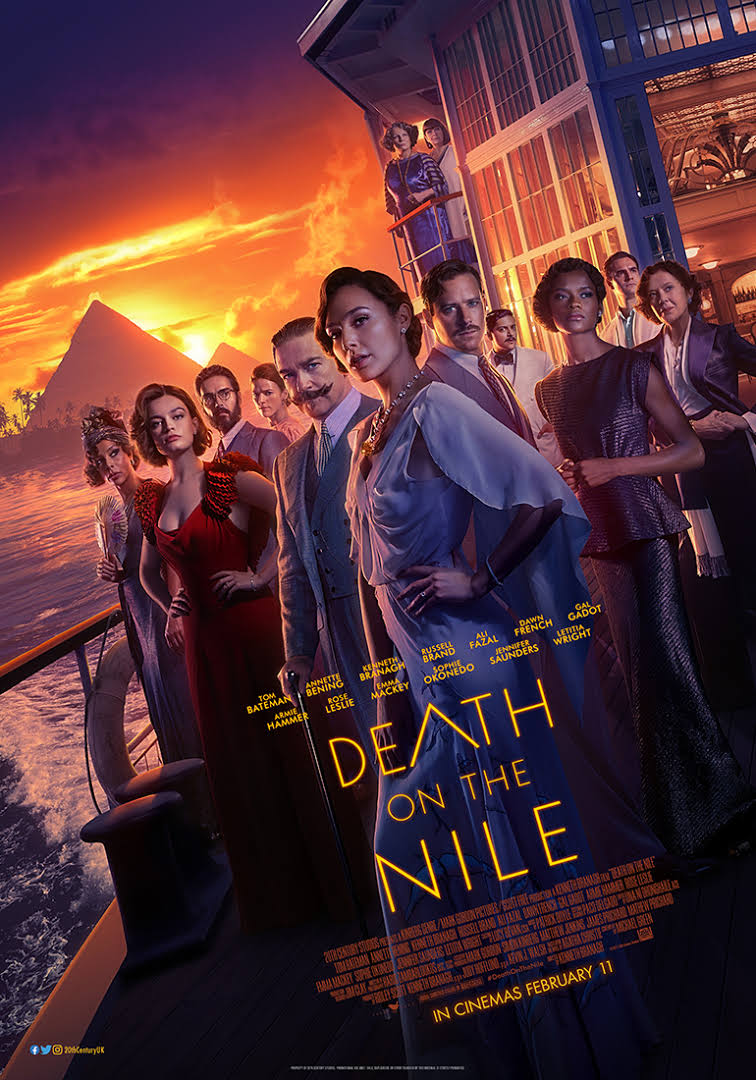Yes, it’s been done plenty of times before and yes, it’s formulaic and conventional, but just as other folks love their action or their superhero or their cop franchise, I love a good whodunnit, especially a lavishly-produced Agatha Christie with an all-star ensemble cast. And while Kenneth Branagh may not be the best Hercule Poirot (David Suchet is, I reckon) he is the thinking woman’s crumpet (or one of them) and his presence in the lead role and also as director and co-producer can’t but bestow a touch of class.
My movie companion is something of an Agatha Christie buff and had actually re-read the book not so long ago. She said this new movie version of Death on the Nile was reasonably faithful to the book, at least as far as the mechanics of the murders are concerned.
Where it departs from the book is in Branagh’s add-on, by way of a prologue and an epilogue, of a romantic backstory for Poirot which starts in the trenches of WWI and ends in tragedy. The point of this seems to be to explain Poirot’s celibacy as well as his extravagant moustache, and to show him as having a heart as well as a brain. But why mess with Christie’s fussy, vain, aspergic Belgian detective?
The murders that call on Poirot to exercise his ‘little grey cells’ take place on a luxury boat cruising the Nile. Poirot is on a holiday cruise but gets tangled up with a wealthy young couple, Simon and Linnet, celebrating their honeymoon with an assortment of friends, family and hangers-on. They welcome Poirot’s presence because they want him to keep an eye on his ex Jackie, who might have hostile intentions towards them because, y’see, Jackie had been Linnet’s best friend, but when Jackie introduced her best friend to her boyfriend, the cad promptly dumped her and ran off with the wealthy and beautiful Linnet!
Re-creating the period in extravagant high style is crucial to the genre. Death on the Nile is set in the ‘30s, and while the costumes and settings are suitably splendid, and you would die to cruise on the fabulous Karnak, I was a bit bothered by a pornographic dancing scene, not because I’m a prude but because I doubted its period authenticity.
As with all remakes of Death on the Nile we get to see the spectacular rock statues at Abu Simbel up close. We also get to see the pyramids at Giza, due to some plot detailing in the getting of Poirot onto the Karnak. I visited the pyramids a couple of years ago and found myself wondering how Branagh and his co-producer Ridley Scott managed to clear the set of the hordes of tourists, guides, hawkers and camels.
Fun facts about the two lead roles: Linnet is played by Gal Gadot, an Israeli actress whose stint in her country’s military has seen the movie banned in Lebanon and Kuwait. Simon is played by Armie Hammer, whose star was on the rise but whose presence in this leading role is not being trumpeted too loudly because news has since emerged of his bizarre and possibly criminal sexual practices. You’ll just have to google that.
Certain adjustments have been made to the proclivities and occupations of the other characters for the sake of diversity and colourblind casting. These aren’t too jarring. A romance novelist has become a black jazz singer (Sophie Okonedo, a familiar face who’s been in umpteen things). An American socialite (Jennifer Saunders) has taken on the Marxist leanings of an omitted male character. This chardonnay socialist and her nurse/companion (Dawn French) are now a lesbian couple. Their uncloseting is part of the denouement.
One of the joys of ensemble pieces like this is doing the ‘what’s he /she been in?’ thing with your companion. (This should be done in a quiet whisper. On no account should you pollute the cinematic darkness by firing up your mobile phone to google the answer.) My friend, who’s almost as good as Google when it comes to screen actors, reminded me that Emma Mackey (Jackie, the spurned ex) was the love interest in Eiffel, but even she didn’t recognize Russell Brand without his long black hair.
Everyone knows Annette Bening because she’s the cerebral Hollywood gal who married equally cerebral – some might say vain – Hollywood enfant terrible Warren Beatty. (They’ve got four children. Did you know that? I didn’t.)
Overall, Death on the Nile sticks to the formula although we couldn’t see the point in making Poirot a tragic hero. Perhaps Branagh is missing his Shakespearean work. We both thought it might have benefited from a bit more campiness and a bit less portentousness. More Suchet, less Shakespeare, so to speak.


